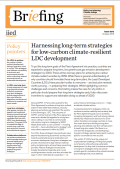
This briefing, Harnessing Long-Term Strategies for Low-Carbon Climate-Resilient LDC Development, makes the case for why LDCs in particular should prepare their long-term strategies early. It also discusses incentives to support and rationalise doing so ahead of 2020.
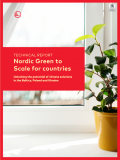
Nordic Green to Scale 2 analyses the potential of scaling up existing climate solutions in two regions: the Baltic countries, Poland and Ukraine in Europe; and Kenya and Ethiopia in East Africa. This report reflects the study results for the five European target countries (Estonia, Latvia, Lithuania, Poland and the Ukraine). Ten different solutions have been selected out of those included in the two previous studies as particularly promising for that region. The analysis covers emission reduction potential, costs and savings as well as cobenefits of scaling up the selected solutions.
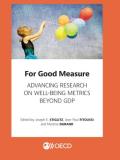
This report looks at key issues highlighted by the 2009 Commission on the Measurement of Economic Performance and Social Progress (“Stiglitz-Sen-Fitoussi” Commission), such as how to better include the environment and sustainability in our measurement system, and how to improve the measurement of different types of inequalities, of economic insecurity, of subjective well-being and of trust.
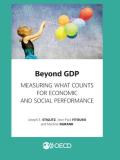
While GDP is the most well-known, and most powerful economic indicator, it can’t tell us everything we need to know about the health of countries and societies. In fact, it can’t even tell us everything we need to know about economic performance. This report looks at progress made over the past 10 years in collecting well-being data, and in using them to inform policies.
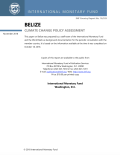
Belize is exceptionally vulnerable to natural disasters and climate change. This report, Belize: Climate Change Policy Assessment, takes stock of Belize’s plans to manage its climate response, from the perspective of their macroeconomic and fiscal implications. It suggests macroeconomically relevant reforms that could strengthen the likelihood of success of the national strategy and identifies policy gaps and resource needs.
